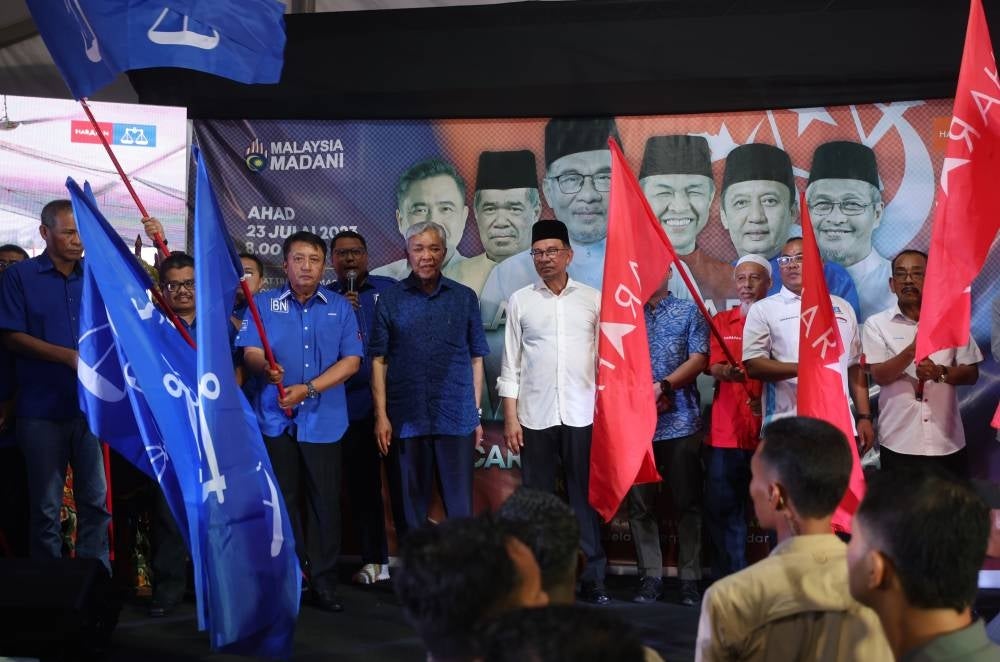Will BN's unsavoury reputation and PH's liberal image cost the Unity Coalition state support?

After announcing their full slate of candidates, parties representing the Unity Government appear prepared for a defensive battle in the states over which they preside, namely Selangor, Penang, and Negeri Sembilan. It makes perfect sense for the two main coalitions to work together, with Pakatan Harapan (PH) concentrating on mixed-urban seats and Barisan Nasional (BN) focusing on Malay-rural ones.
In this way, resources are not wasted.
As in my previous piece, I will give my opinion on the upcoming elections starting with Negeri Sembilan, the state I believe offers the most security for the Unity Government. I am not suggesting that PH and BN might lose Selangor and Penang, but in Negeri Sembilan they may have more of an upper hand.
Unlike the other five states, Negeri Sembilan voters gave Perikatan Nasional (PN) zero seats in the parliamentary elections last year. What has transpired, as seen by a comparison of the outcomes of the 14th and 15th general elections, is that BN voters have returned to the coalition's fold after briefly deviating from it.
The Unity Government appears to be safest in Negeri Sembilan given the strength of BN's machinery and the devotion of its followers, as well as the achievements made by the PH state government since 2018.
A 29-year-old interviewed for this piece opined that, “The current government is very good in terms of managing and distributing the people’s money. It is better than the previous government.” Investments more than doubled between 2018 and 2020 (from RM2.86 billion to RM6.39 billion), contributing to the state's respectable 16 per cent GDP growth rate between 2017 and 2022.
The Unity Government should not get their hopes up too high, though, because an unexpected undertow could catch them off guard if people are swayed by the outcome of last year’s general elections and be carried away by the PN wave.
Due to its proximity to PN strongholds in the north of the peninsula, Penang has a better chance of experiencing some ripples of green compared to Negeri Sembilan. From no parliamentary seats previously, Pas won two seats in 2022 with another won by Bersatu. One of the biggest upsets from last year took place in Permatang Pauh, where a relatively unknown candidate defeated the prime minister's daughter.
A 23-year-old student of mine from Permatang Pauh shared, "The view [of my community] now I see has changed towards Perikatan because of the sentiment and narrative played by them".
Despite this, he predicted that the PH government would continue to hold sway in the state because "many people are satisfied with the government" and "the population in Penang is quite balanced between Bumiputera and non-Bumiputera."
It is difficult to picture the mostly Malay-Islamic nationalist parties within Perikatan Nasional winning Penang, where the Malay and Chinese populations are nearly equal. Difficult, but not impossible.
Finally, Selangor, often considered to be PH's crown jewel, is currently showing signs of becoming the most difficult battleground. The ISEAS-Yusof Ishak Institute recently published two articles that presented contrasting viewpoints on whether or not Selangor would fall to Perikatan.
Six seats in parliament were won by PN in 2022, despite the state's well-documented growth rate of 27.4 per cent from 2017 to 2022 under the PH government. There could be a variety of causes for this.
To begin, it's possible that certain residents of Selangor, particularly those living in suburban and rural areas hit hard by post-Covid instability, didn't feel the effects of the growth as strongly as others closer to Kuala Lumpur. Second, it's possible that, when all is said and done, the people are still searching for a party that can safeguard their identities, particularly the Malay identity, so that they feel a sense of belonging in this rapidly evolving world.
In order to win back the support of the Malays, BN must shed its unsavoury reputation. Unfortunately for PH, liberalism has become a tainted word in Malaysia. That leaves Malay voters with PN.
A 29-year-old Selangorian told me, "The current state government (PH-PKR) is too comfortable as they have been ruling Selangor for the past 15 years. Honestly, I do hope that PH-PKR will not win with a clean sweep. I hope there will be quite a significant number of oppositions in Selangor to act as check and balance".
When the government looks to favour the establishment over the people, as has been seen in other parts of the world, the people, and especially the young, are more likely to demand changes.
As I mentioned previously, these are merely some pre-election reflections.
There are a lot of variables that could change the trajectory of any of the six states. For instance, the recent arrest of Datuk Seri Muhammad Sanusi Md Nor has likely energised his supporters and the PN base to the polls to vindicate their leader.
The unexpected death of Datuk Seri Salahuddin Ayub, however, may elicit sympathy and bring the Rahmah effort and its many successes to the forefront of people's minds. Even while death shouldn't be politicised, it's only human for people to reflect on a leader who was particularly good to them.
In Malaysian politics, two weeks is a long time. May the best candidate win.
Syaza Shukri, PhD, is an associate professor and the current Head at the Department of Political Science, IIUM.
The views expressed in this article are the author's own and do not necessarily reflect those of Sinar Daily.












